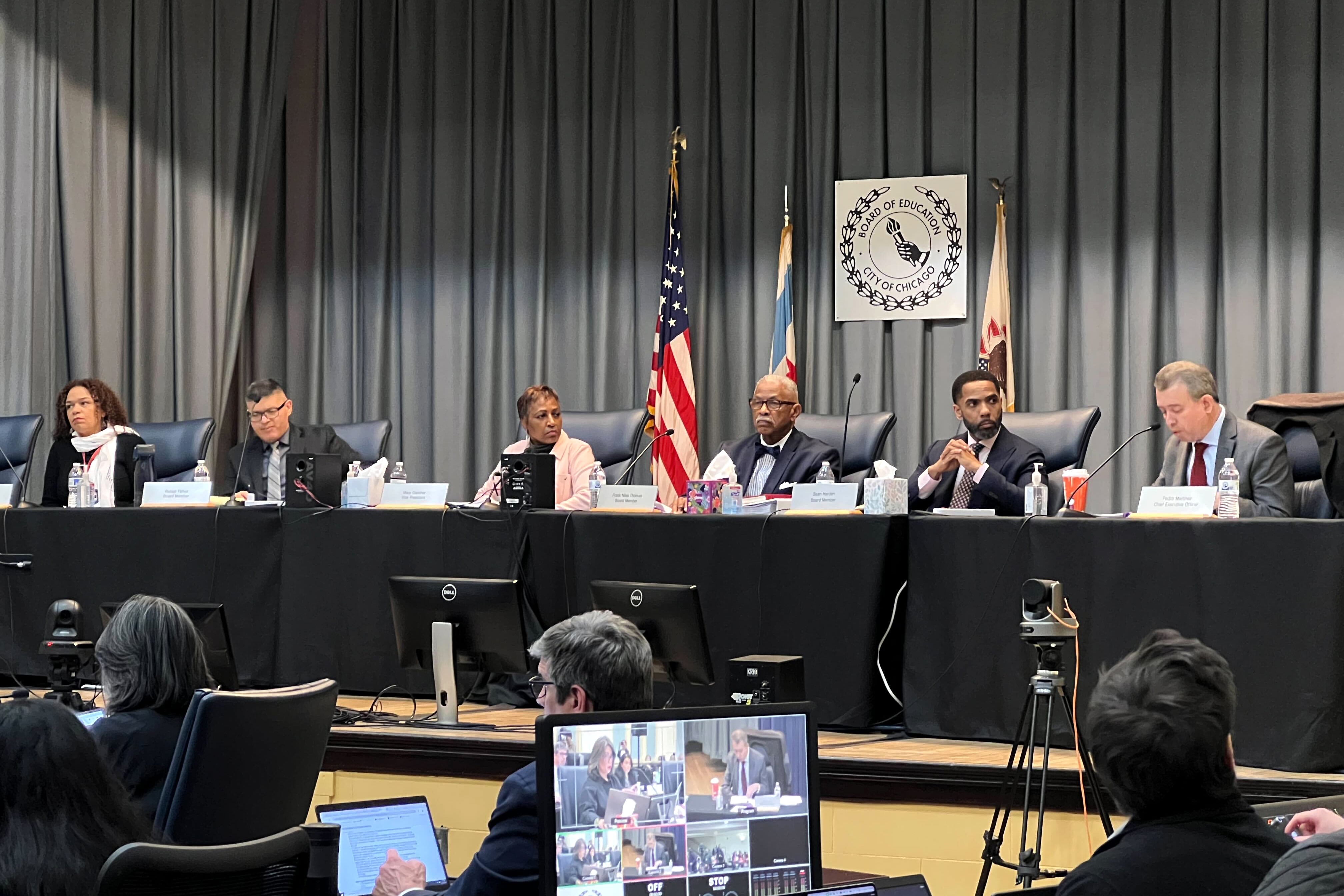Sign up for Chalkbeat Chicago’s free daily newsletter to keep up with the latest news on Chicago Public Schools.
Three days after voting to fire the school district CEO, Chicago Board of Education members took the extraordinary step Monday of attending contract negotiations between the district and the Chicago Teachers Union.
The lawyer for Chicago Public Schools CEO Pedro Martinez responded with a letter demanding board members cease and desist from attending negotiations, describing it as “unlawful interference” with Martinez’s authority.
The back-and-forth shows how the vote to oust Martinez has taken the power struggle over the nation’s fourth largest school district into a new, more public phase.
It also could signal that Mayor Brandon Johnson and his handpicked school board feel a sense of urgency — and perhaps see an opportunity — to get a deal done.
The union previously called for an agreement by Christmas. Negotiations started eight months ago and have become increasingly tense.
Board members Olga Bautista and Frank Thomas attended negotiations in the morning, and board President Sean Harden attended in the afternoon, according to Chicago Public Schools spokesperson Mary Ann Fergus.
Harden told Chalkbeat that the board members attended on their own, without the direction of the mayor, to “observe and be part of the support” for CPS.
“I, along with the other board members, thought it was incredibly important for our team to feel supported,” he said, adding they wanted to “make sure the talks continue.”
The mayor’s office did not respond to a request for comment, and CPS did not share Martinez’s thoughts on board members attending. But according to two sources who have spoken with the CEO, Martinez was “surprised” to hear board members planned to attend negotiations.
Typically, contract negotiations are left to bargaining teams from the district administration and union.
CTU vice president Jackson Potter wrote on social media that it was the first time board members have attended negotiations since 2012 bargaining was winding down, when then-Board President David Vitale attended. Potter wrote that members attended to help “both sides land an agreement.”
The 2012 contract negotiations led to a strike that attracted national attention. A former board member who served with Vitale described the context on condition of anonymity because he did not receive required approval from his employer to speak to the media. He said Vitale joined negotiations during “a very tense moment” because he was directed to do so by then-mayor Rahm Emanuel and then-CPS CEO Jean Claude Brizard. Before that, neither he nor his co-members were involved in negotiations, the former board member said.
“What is the function of a board? It is generally to conduct oversight and accountability and governance of management,” he said. “Board is not management.”
A board member sat in on negotiations on at least one other instance, also during labor strife. Board member Miguel Del Valle attended ahead of the union’s 2019 strike.
Martinez — who was not present at negotiations on Friday — continues to oversee the district because his contract stipulates that he is to stay on for six months if he is fired without cause, which is the route board members took. The resolution on Martinez’s firing states the board wants to modify his powers but does not specify how. Martinez said after Friday’s vote that he didn’t know what the board had in mind, but he urged reporters to “get to know” his attorney.
Martinez has clashed with Johnson, a former CTU organizer and continued close ally, over how to pay for the union’s contract demands and $175 million in pension obligations that the city wants to shift to CPS. He has resisted the mayor’s suggestion for CPS to take out a short-term loan to pay for labor contracts and pension obligations. Amid that tension, the former Board of Education — mostly appointed by Johnson — resigned en masse in October.
Negotiations have become increasingly tense since Johnson asked Martinez to resign in the fall. The union’s initial 700-plus proposal package has been pared down in recent weeks in an effort to close a deal. Current demands include a 6% raise in the first year of the contract, hiring additional staff over the life of the contract, and more teacher prep time in elementary schools — an issue the city’s principals union has taken issue with.
The union believes its demands would add critical support to schools and beef up protections for LGBTQ and immigrant students after President-elect Donald Trump takes office.
CPS has not outlined how it will pay for the contract in the next fiscal year. District leaders have raised concerns about the potential cost, pointing to a projected $500 million deficit next year before the cost of labor negotiations.
Johnson won’t have sole control over who serves on the board for very much longer. Ten members elected by voters in November will take their seats Jan. 15, joining 11 Johnson appointees. Johnson has picked 10 people for the board so far. The board will be fully elected in 2027, when Johnson is up for reelection.
Reema Amin is a reporter covering Chicago Public Schools. Contact Reema at ramin@chalkbeat.org.





